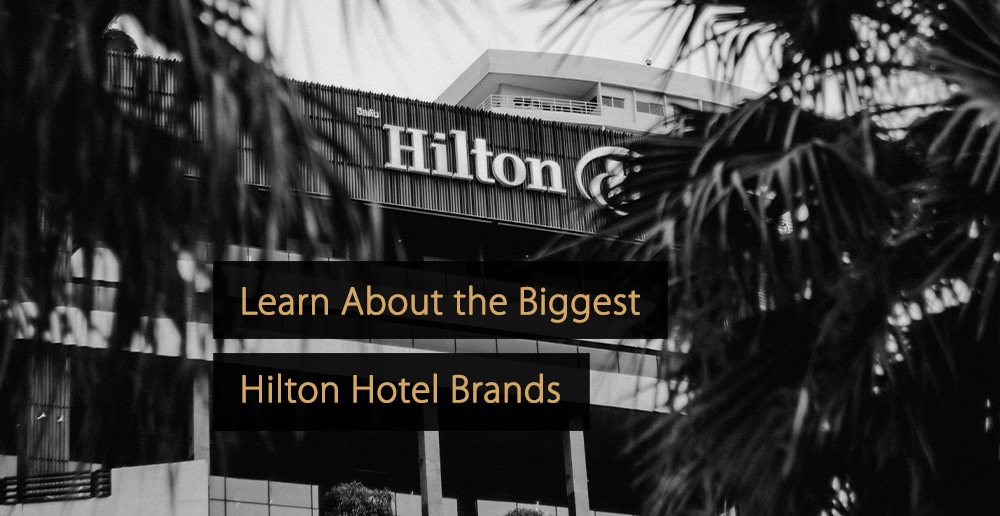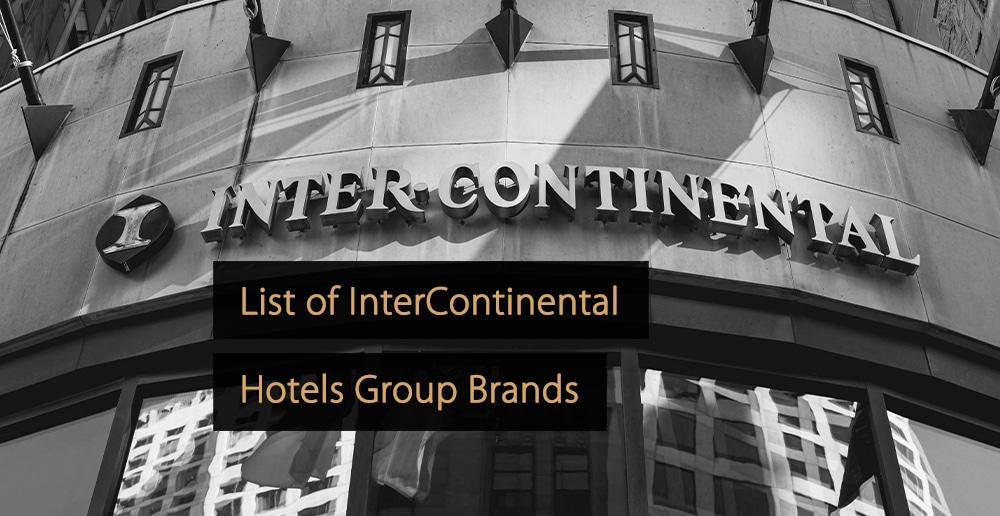Hilton hotel brands highlight how a single company can encompass multiple domains while retaining its identity. The company has expanded into a wide variety of different markets while maintaining full consistency in Hilton’s overall branding. The importance of the Hilton hotel brand is, in many ways, synonymous with the importance of branding itself. Corporate branding gives you the chance to see how seemingly disparate ideas can become a singular whole. In this article, you’ll learn how Hilton takes these ideas and melds them together. Likewise, you’ll see why they’re successful.
Table of Contents:
- What Is the Hilton Brand?
- What Is Hilton Honors?
- 11 of the Many Hilton Brands
- Key Success Points from the Hilton Brand
- Understanding the Larger Context of Hotel Brands in Hilton Hotel Brands
- Comparing Hilton Hotel Brands and Marriott’s
What Is the Hilton Brand?
The Hilton brand typically refers to Hilton Worldwide Holdings Inc. The Hilton brand was created by Conrad Hilton in 1919 and currently encompasses a range of hotel-related services with resorts, hotels, and even timeshare properties. Despite being a singular entity the Hilton brand encompasses over 22 different brands. This can be further broken down into 1,182,937 rooms within 7,530 properties. Hilton hotel brands have changed the hotel industry by showing how dedication to standards and innovation can set brands apart from the competition while still maintaining consistency.
Video: Hilton Hotel Brand
What Is Hilton Honors?
In short, the Hilton Honors program is a customer loyalty system that is used in over 6,800 properties and 118 million people. The program gives users points which can be redeemed over various Hilton properties. The points can be exchanged for services such as free night’s stays, upgrades for rooms, and more – even charitable donations. On top of that, there’s also a tiered membership. These levels include the basic member level, silver, gold, and diamond ranking. The benefits go up as the ranking increases. For example, access to special members-only lounges.
11 of the Many Hilton Brands
There are a lot of Hilton hotel brands. However, each of the following has something particularly noteworthy that makes them the best of the best.
Hilton Hotels & Resorts
Hilton Hotels & Resorts are the most well-known of Hilton hotel brands. It’s the flagship brand of the larger entity of Hilton Hotels. The brand is important because it essentially defines Hilton for the average person. When people think of Hilton, it’s the element that comes to mind. The brand is found in over 90 different countries and with 600 individual properties. They’re often by airports and convention centers.
Waldorf Astoria Hotels & Resorts
Waldorf Astoria Hotels & Resorts is one of the most luxurious Hilton hotel brands. It offers top-tier spas and restaurants for the enjoyment of guests. The Waldorf’s importance stems in large part from its global reach. You can see that it’s possible to offer amazing luxury all over the globe. In fact, there are over 34 Waldorf locations. They’re found in New York, Rome, and other locations steeped in history.
Video: Waldorf Astoria Maldives Ithaafushi
LXR Hotels & Resorts
LXR Hotels & Resorts is one of the Hilton hotel brands with a sense of adventure. They’re built in destination areas and various city centers. It’s an especially important brand as it shows how immersive experiences create something new. Guests can feel the adventure of the area they’re staying within. LXR Hotels & Resorts is often seen as a base for different adventures. A place of both rest and preparation.
Embassy Suites by Hilton
Embassy Suites by Hilton is a Hilton hotel brand that stresses full-service leisure for business travelers. It does so in over 234 different, upscale, locations. The brand’s importance among other Hilton hotel brands is in part because of its business-focused customer service. It’s heavily weighted to the needs of professionals. Some of the features offered include free breakfasts that are made-to-order and receptions with snacks and beverages. Rooms also have similar.
Curio Collection by Hilton
Curio Collection by Hilton provides a more boutique-oriented hotel experience. The brand is found in 90 locations, with 45 of them within the United States. The importance stems from its one-of-a-kind nature amid the Hilton hotel brands. It has Hilton’s broad platform but with some local and always unique flair. The brand was created in 2014 and has become one of Hilton’s more travel-focused brands. It’s perfect for discovering local flavor.
Conrad Hotels
Conrad Hotels and Resorts is another one of the Hilton hotel brands that focuses on luxury. It has 23 separate properties located on 5 continents. It’s especially important as it showcases the significance of bold design concepts. It also shows how locally inspired concepts can work within Hilton’s larger branding. The brand has been active since 1982 and was named by the founder – Conrad Hilton. And to this day it’s wonderfully sophisticated.
Homewood Suites by Hilton
Homewood Suites by Hilton are among the brand’s residential-style properties. They’re primarily intended to compete within the more upscale market for the all-suite-residential style selections. Homewood Suites are significant within Hilton hotel brands partially because of its 20-year history. It also shows Hilton’s capacity for longer-term, extended-stay, markets. The suites provide food options with a kitchen and free breakfast. And it can even accommodate pets. It’s also great for families.
Canopy by Hilton
Canopy by Hilton is one of the more dynamically designed Hilton hotel brands. It has a local feel, but one specifically created by customer testing. They’re an important way to show alternative managerial styles. Employees are “enthusiasts”, beds have a “canopy”, and innovation grows naturally out of the guest’s feedback. There are currently twelve new Canopy locations and more are planned in the upcoming years. The locations also incorporate an area’s culture.
Hilton Garden Inn
Hilton Garden Inn is one of the Hilton hotel brands which puts an emphasis on focus. It’s mid-priced and accommodates both business and leisure-based travelers. The brand’s significance comes from its lower-cost nature. Hilton Garden Inn highlights Hilton’s willingness to explore beyond the usual assumptions of their typically higher-cost branding.
Hampton by Hilton
Hampton by Hilton is also known as both Hampton Inn & Suites and Hampton Inn. The chain is largely targeting the more midscale price range. Hampton by Hilton’s significance is partially as evidence of what independent franchisees can do. They’re usually independently owned, though Hilton does manage a few locations. Additionally, the cost to guests is lowered by minimizing the options for food and drink. This keeps Hampton by Hilton very affordable.
Home2 Suites by Hilton
Home2 Suites by Hilton is a large entry among the Hilton Hotel Brands, with 478 locations. It’s specially tailored as a home for extended-stay travelers. Home2’s significance stems from the fact that it’s so focused on being a home away from home. It ranges from 1-bedroom to studio sizes. The layout of those areas is spacious, and it’s even pet-friendly. Guests can also enjoy exercise facilities, recycling options, and more.
Key Success Points from the Hilton Brand
- Exemplary customer support: The Hilton hotel brands all provide high-quality customer support to build their reputation.
- Carefully planned growth: The Hilton expands and creates partnerships through careful planning to promote sustainable growth.
- Cutting-edge technologies: The Hilton hotel brand is synonymous with new technologies like digital check-in which elevates the customer experience.
- Eco-friendliness: The brand uses energy conservation and green tech to appeal to the expectations of the environmentally conscious traveler.
- A strong model for franchises: The model uses consistent standards to ensure independent owners have solid foundations.
- Personalized luxury: Brands like Conrad and Waldorf Astoria offer uniquely tailored experiences for personalized stays.
Understanding the Larger Context of Hotel Brands in Hilton Hotel Brands
There are, of course, many more brands out there. Different brands and different regions show how various strategies can work in your favor. For example, social media marketing for hotels worldwide and how tourism marketing works in those locations can be quite different than with Hilton hotel brands. Studying these differences can show how to leverage them when offering accommodation or Hotel technology to various parties. You can find out more about the brands in the article “List of the Excellent Hotel Brands to Work For.”
Comparing Hilton Hotel Brands and Marriott’s
Hilton hotel brands highlight some of the most important hotel trends. But the Marriott brand also shows how the industry is evolving. Most of Marriott’s brands have a specific target demographic. And like with the Hilton, the Marriott also has rewards programs. By comparing these two distinct yet similar brands, it’s possible to see how different approaches can yield specific results. Likewise, you can also see how each of the brands has reacted to the different hospitality trends. You can find out more about the Mariott branding in the article “Marriott Hotel Brands: Exploring the Brands of Marriott International.”
Hilton hotel brands offer a wealth of examples for hotel management and marketing. However, it’s also important to consider each in isolation and as a blueprint for your own specific goals.
Did You Like This Article About Hilton Hotel Brands?
You might also be interested in the following articles:
- IHG Hotel Brands: List of InterContinental Hotels Group Brands
- AAA Travel Agency Overview, Services & Benefits for Hoteliers
- Hospitality Training: Need-to-Know Courses to Train Your Staff
- Travel Companies That Help Hotels To Increase Revenue
- Tour Agencies That Help Hotels To Grow Their Revenue
More Tips to Grow Your Business
Revfine.com is the leading knowledge platform for the hospitality and travel industry. Professionals use our insights, strategies, and actionable tips to get inspired, optimize revenue, innovate processes, and improve customer experience.Explore expert advice on management, marketing, revenue management, operations, software, and technology in our dedicated Hotel, Hospitality, and Travel & Tourism categories.









Leave A Comment